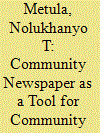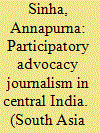|
|
|
Sort Order |
|
|
|
Items / Page
|
|
|
|
|
|
|
| Srl | Item |
| 1 |
ID:
168240


|
|
|
|
|
| Summary/Abstract |
This paper evaluates readers’ perceptions of Idikelethu newspaper as a tool for community development, particularly in Alice, in the Eastern Cape Province of South Africa. Data was collected from two focus group discussions that were held in the areas where Idikelethu newspaper has high readership rates. The findings revealed that development-related issues such as health awareness, education and community safety, among others, are regularly addressed by this community newspaper. Based on the findings and analysis of data, this study concludes that Idikelethu newspaper contributes in many ways to the development of its readers and Alice community in general. It is anticipated that the findings of this paper will play an important role in assisting Idikelethu and other community newspapers to function better as agents of community development.
|
|
|
|
|
|
|
|
|
|
|
|
|
|
|
|
| 2 |
ID:
190674


|
|
|
|
|
| Summary/Abstract |
This case study of a community newspaper, Namaskar, and its impact in ‘underdeveloped’ areas of coastal Odisha in India, discusses the potential of alternative media for social change. It scrutinises and analyses the participatory advocacy activities of Namaskar. Studying participatory journalism favours a more dialogical and reflexive approach, which also draws on ideas of ‘critical’ and ‘radical’ media, while also calling attention to the significance of content in bringing about social change. Building on observations and testimonies from the field, collected through multiple qualitative methods for data collection, the study infers that Namaskar ensures significant participation in its advocacy practices, leading to observable changes in and around its catchment area. However, basic gatekeeping and editing work to make news copy print-ready also restrain the extent of ‘absolute participation’.
|
|
|
|
|
|
|
|
|
|
|
|
|
|
|
|
| 3 |
ID:
173442


|
|
|
|
|
| Summary/Abstract |
One key marker of mass social movements transitioning to participatory democratic governance is popular media access. This essay argues that democratic media access by public constituencies becomes a site for constructing social revolution and simultaneously a manifest empirical measure of the extent of democratic participation in the production, distribution, and use of communication with new cultural possibilities. The participatory production practices (with citizens producing and hosting their own programs) and the democratic content (of oral histories, local issues, critiques of government and business, and everyday vernacular) reflect the hegemony of emerging ‘Bolivarian’ twenty-first century socialism expressed as popular participation in media production. Bolstered by constitutional changes and public funding, popular social movements of civil society, indigenous, women, and working class organizations have gained revolutionary ground by securing in practice the right of media production. Findings indicate that public and community media (that move beyond alternative sites of local expression and concerns) provide a startling revolutionary contrast to the commercial media operations in every nation. Popular media constructions suggest a new radically democratic cultural hegemony based on human solidarity with collective, participatory decision-making and cooperation offering real possibilities and experiences for increased equality and social justice.
|
|
|
|
|
|
|
|
|
|
|
|
|
|
|
|
|
|
|
|
|